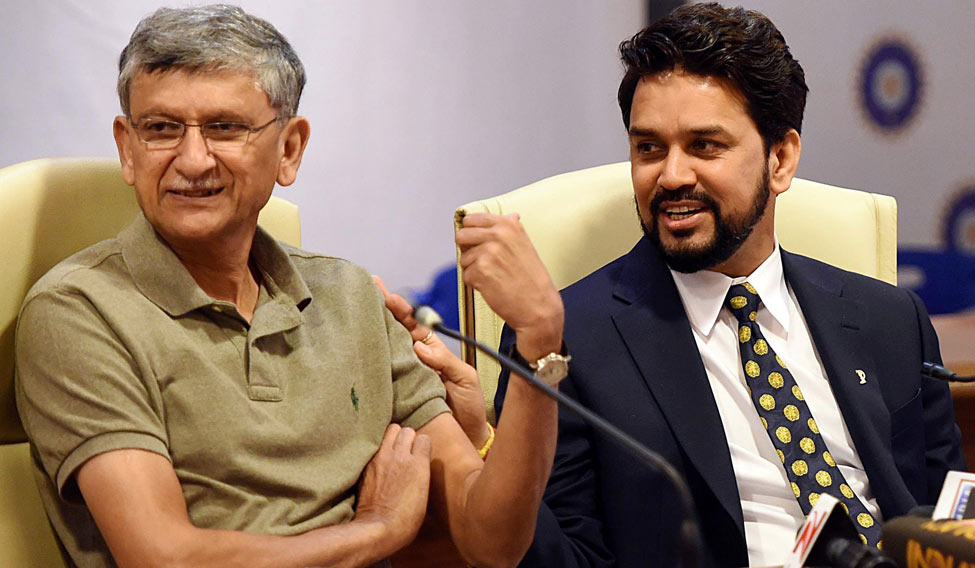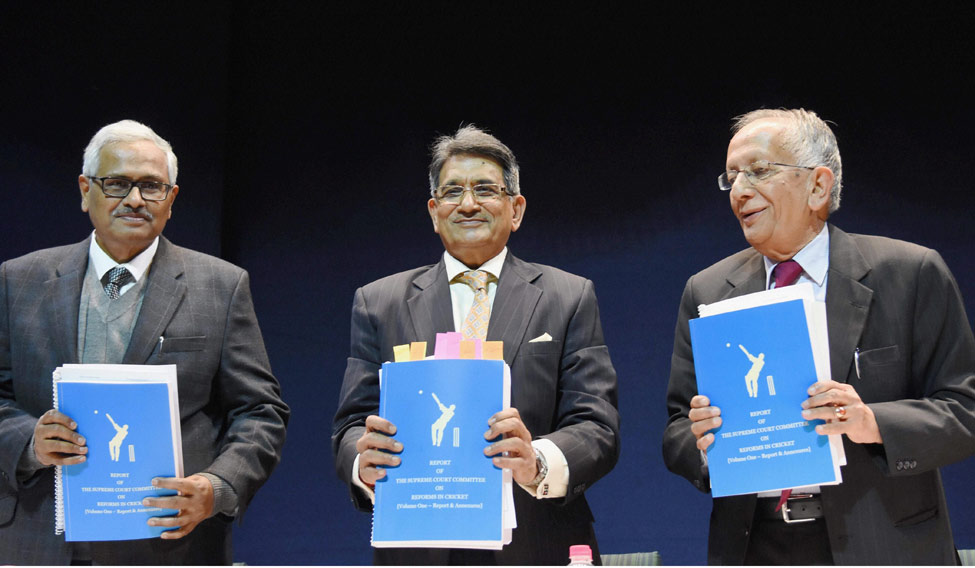“Change or perish”. Said Chief Justice of India T.S. Thakur on July 18, while reading out the 143-page judgement that was going to change the way the Board of Control for Cricket in India functioned. The judgement also brought to close a two-year legal battle to reform the richest cricket body in the world. Or so we thought.
It all began with the Indian Premier League spot-fixing case, which led to the banning of Chennai Super Kings (CSK) and Rajasthan Royals, along with CSK 'owner' Gurunath Meiyappan, between 2013 and 2015. The subsequent power struggle within the BCCI, which was played out in the court, eventually ended the reign and control of former BCCI president N. Srinivasan.
The 2016 judgement shook everybody within the BCCI, regardless of which camp they were in—that of Sharad Pawar, Arun Jaitley or Srinivasan. On January 4 earlier this year, the Supreme Court-constituted three-member committee comprising former chief justice of India Rajendra Mal Lodha and former Supreme Court judges Ashok Bhan and Raju Varadarajulu Raveendran had submitted its report, recommending sweeping changes in the way cricket is administered in the country.
The judgement, after hearing all concerned parties—BCCI and state associations—sought to bring in transparency, good governance through structural and administrative overhaul of the cricket board. It also sought to give more voice and power to players. The age and tenure cap enforced through the judgement meant all officials over 70 years were ineligible to hold any post in the BCCI or its member state associations. It upheld the one state-one vote recommendation, too.
Then came the 'unkindest cut of all' for the board. Politicians were barred from contesting elections or holding any post in the sports body and a cooling period of three years was recommended after completion of one term for all officials. The apex court was always wary of the BCCI's resistance to change but the board's dogged fight would have surprised the court.
“The truth is that resistance to change stems partly from people used to the status quo and partly because any change is perceived to affect their vested interests in terms of loss of ego, status power or resources,” said Justice Thakur, who authored the order. BCCI counsel K.K. Venugopal had then assured the court that the board would abide by the judgement.
The Lodha committee was assigned the task of implementing the recommendations. It also marked the start of the BCCI's resistance to change—now so deeply entrenched in its DNA—which resulted in a complete breakdown of communication between the Lodha committee and the BCCI.
Meanwhile, on July 20, two state associations—Cricket Association of Bengal and Karnataka State Cricket Association—deferred their annual elections fearing action from the apex court. On July 24, former Union minister and former BCCI president Sharad Pawar announced he would step down as the Mumbai Cricket Association (MCA) president. He, however, put the decision on 'hold' later.
On August 2, the board, under the supervision of its president Anurag Thakur and secretary Ajay Shirke, made a move that it will perhaps regret in hindsight. The BCCI working committee approved the formation of a legal panel to liaise with Lodha committee. Former Supreme Court judge Markandey Katju, who headed the panel, went on to pronounce the Supreme Court order as “unconstitutional and illegal” and said the judiciary making laws set a “dangerous precedent”.
On court's order, the Lodha committee then proceeded to issue a set of deadlines on August 9—the deadline for the first phase of reforms was set as September 30 after the BCCI secretary met with the Lodha panel and agreed to implement the recommendations.
However, the relation between the board and the panel was marked by acrimony, with the BCCI allegedly questioning the latter's authority at every step. The BCCI was unrelenting in its attack on the committee, with the court taking note of several statements made by Thakur and Shirke in the media.
It was a downward spiral for the BCCI from there on, as its subsequent moves ended up invoking the ire of both the committee as well as the court. On September 1, the panel issued a final set of deadlines, wherein the BCCI was directed to hold elections to the apex council, which would replace the working committee, and to hold its annual general meeting (AGM) by December 15.
On September 12, ICC CEO David Richardson let the veritable cat out of the bag, by revealing in an interview that Thakur had asked for the ICC's intervention via a letter, calling the reforms a “governmental interference”. Little did Thakur know that it would invite the court's ire three months down the line.
Around this time, the board targeted former BCCI president and incumbent ICC Chairman Shashank Manohar, thus bringing their differences out in the open. The BCCI officials criticised Manohar publicly for deserting 'a sinking ship'.
On September 21, the board went ahead with its AGM, defying the Lodha committee's directions, and even announced the new senior selection committee as per its existing constitution.
The AGM was a virtual red rag to the Lodha panel. The patience of the three-member panel had been severely tested by the BCCI. On September 28, it submitted the first of its three status reports, which listed date-wise the instructions given to the board by the panel and the former's action or lack of it. It ended the report with the recommendation of superseding the current office bearers with an ad hoc panel to ensure the implementation of the reforms. They accused the BCCI officials of creating “serious impediments” and obstructing reforms. An angry Justice Thakur warned the board to fall in line “or we will make you fall in line”. It also warned the BCCI to not test its patience or force it to “take unpleasant actions” time and again.
On September 30, the BCCI missed the first deadline set by the Lodha panel by failing to adopt the Memorandum of Rules and Association and Rules and Regulations at the special general meeting (SGM), citing technical reasons related to incomplete authorisation of some representatives to attend the meeting. Meanwhile, Vidharbha and Tripura Cricket Associations announced full implementation of Lodha reforms. The BCCI SGM reconvened the next day and decided not to adopt the recommendations related to age cap of 70 years, tenure, cooling-off period and one-state-one-vote.
 BCCI president Anurag Thakur along with BCCI secretary Ajay Shirke during a press conference in Mumbai | PTI
BCCI president Anurag Thakur along with BCCI secretary Ajay Shirke during a press conference in Mumbai | PTI
The Lodha panel cracked the whip on October 3, asking banks not to disburse BCCI funds from its accounts. Naturally, the board cried foul. The next day, the Lodha panel issued a press statement accusing the BCCI office-bearers of misleading statements, which allegedly created the impression that the New Zealand series at home was at risk. It clarified that the “Supreme Court committee had not frozen BCCI accounts related to routine administration and conduct of cricket matches”.
The panel had objected to funds being transferred to state associations in the emergent working committee meeting of the BCCI held on September 30 after it suspended its SGM. Almost Rs 500 crore was believed to have been disbursed to 13 associations as part of their annual central subsidy.
On October 6, the BCCI was given one-day deadline by the court to submit an undertaking that it would implement all reforms “unconditionally”. The court also hinted that if they failed to do so, the office bearers would be removed.
The Supreme Court also passed an interim order by which states were refused any money from the BCCI until they passed a resolution to implement the Lodha reforms. The board aired its grievances and objections in public.
The court also ordered the BCCI president to give a personal affidavit clarifying whether he had asked the ICC for a letter that described its order as “government interference”. Secretary Shirke and chief administrator officer Ratnakar Shetty, too, were asked to submit similar affidavits.
The Lodha committee filed its third status report on November 14. Adding to its previous recommendation of superseding the current office-bearers, it recommended that “while day-to-day administration of BCCI could continue to be carried out by its CEO and certain Managers”, it felt the need to have an “Observer” to guide them in matters of administration, awarding of contracts and tenders. It recommended former Home Secretary G.K. Pillai's name for the post of the observer.
The court resumed the hearing on Lodha committee's status report in December. It rejected BCCI's special review petition and curative petition. On December 15, the Supreme Court prima facie found Thakur guilty of both contempt of court and perjury. A furious Justice Thakur said the BCCI president could face jail for lying under oath. It also threatened to prosecute Shetty for the same as he had denied that the board had requested the ICC for the letter, in his affidavit. This was after court-appointed amicus curiae Gopal Subramanium said that both Thakur and Shetty tried to obstruct the process of reforms and implementation of judicial orders.
Thakur, on the other hand, had stated in his affidavit that he had only sought a “clarification” from the ICC. Manohar, who was also asked to file an affidavit in the matter, confirmed that Thakur had, indeed, requested for such a letter from him which he had declined to give. Taking strong exception to the BCCI's contempt for the ruling, the court asked Thakur to apologise if he wanted to escape perjury charges.
The removal of all current office-bearers of the BCCI appears imminent, with the three-judge bench ordering the board to come up with its set of names that could form part of the ad hoc committee, which will run the affairs of the board and ensure the court order regarding the structural and administrative reforms is complied with fully.
The court has reserved its order for January 3, 2017. The court also made it clear that it will not reconsider its July 18-judgement, saying, “After judgement you are not allowed to think it is not rule of law.”
The first impact of this was seen on December 17, when Pawar submitted his resignation as the MCA president.





